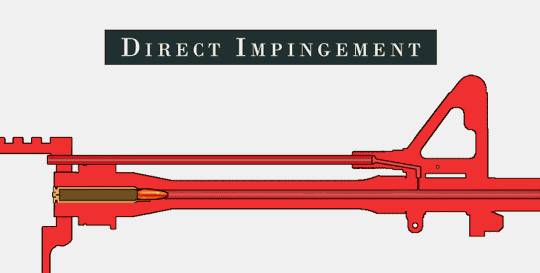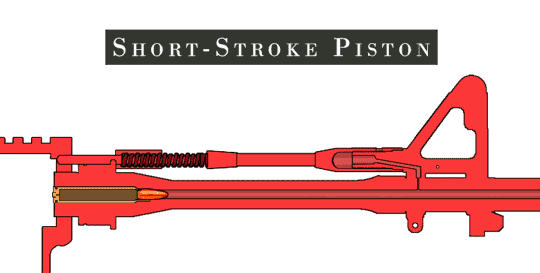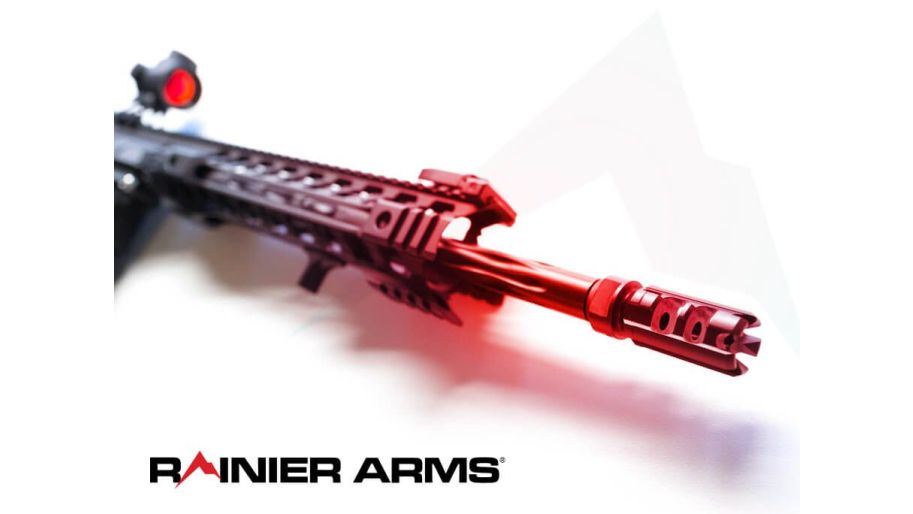The Direct Impingement vs Gas Piston: Which One is Better
Direct impingement vs gas piston is a debate that has been raging for some time now.
In each debate, you can see one side saying gas piston is better than the other while the other side claims direct impingement is way better.
Well, both sides are somewhat right, but, as both these systems have their own benefits and drawbacks.
Through this article, we will explore this topic a little more so you can choose the right system suiting your needs the most.
What is Direct Impingement?
In the direct impingement system, gas from the bullet goes through a small hole in the barrel and goes directly into a part called the bolt carrier group. The gas pressure then pushes the bolt carrier group backward, which makes the gun work and gets rid of the used bullet shell.

Image source: Wikipedia
This system works by using the energy from the exploding gunpowder to make the gun work. It does this by sending the gas straight to the bolt carrier group, so there's no need for another part called a piston.
Shop gas tubes here!
Shop gas blocks here!
What is Gas Piston?
Gas piston systems work differently than direct impingement systems. Instead of sending gas directly into the bolt carrier group (BCG), gas piston systems use a piston located near the front of the gun. Here's how it works: when a bullet is fired, the gas pressure pushes the piston backward, which then moves the bolt carrier group backward, making the gun work.

Image source: Wikipedia
Using a gas piston system has some advantages, especially when using suppressors (silencers). The cool thing is that the gas flow is separated from the action, so it helps prevent extra gases from going back into the receiver. This is important because those extra gases can cause more dirt and gases to build up, and that's not good.
This is particularly useful if you’re using suppressors often because it helps keep the gun reliable and requires less cleaning.
One thing to keep in mind is that gas piston systems add some weight to the front of the gun because of the piston and its parts. But here's the good news: that extra weight actually helps reduce the kick when the gun is fired. So, gas piston rifles tend to have smoother recoil, which makes them more comfortable to shoot.
Comparisons
Reliability
Direct impingement systems have been widely used in the military and by regular people for a long time, and it has proven to be dependable when it is taken care of properly. However, since the internal parts are directly exposed to dirt and carbon buildup, it can cause issues in challenging situations where there's a lot of dirt or harsh conditions.
On the other hand, gas piston systems are generally considered very reliable. They have a clever design that separates the gas flow from the moving parts, which helps prevent problems caused by dirt and buildup.
This feature makes gas piston systems an excellent choice for tough conditions where reliability is extremely important, such as in military or law enforcement operations.
Maintenance
Direct impingement needs more frequent cleaning and upkeep compared to gas pistons. The direct exposure of the internal parts to the gas flow increases the chances of dirt and carbon buildup, which can negatively affect the gun's performance.
Gas piston systems, on the other hand, generally require less frequent maintenance. Since the gas flow is separated from the moving parts, there is less dirt and carbon buildup, reducing the need for regular cleaning.
This is a great option if you prefer a low-maintenance gun or engage in activities involving lots of shooting.
Cost
Direct impingement systems are generally more budget-friendly. The design is simple, and these systems are widely available and mass-produced, which means there are more affordable options to choose from.
This makes direct impingement systems popular among shooters on a budget or those who are looking for an entry-level firearm.
On the other hand, gas piston systems typically have a higher price tag. The extra parts and engineering involved in their design contribute to the increased cost. However, this higher price often reflects the added benefits they offer, such as enhanced reliability and reduced maintenance requirements.
These features may justify the investment if you prioritize reliability and reduced maintenance and are willing to pay a bit more.
Final Words
In conclusion, choosing between direct impingement and gas piston systems depends on your personal preference and how you plan to use a firearm. direct impingement systems are popular because they are simple, affordable, and reliable for most shooting situations.
Gas piston systems offer added reliability, especially in tough conditions, as they separate the gas flow from the moving parts. They have benefits like reduced fouling, increased durability, and smoother recoil. If you value reliability and often encounter challenging conditions you may go for gas piston systems.
Additional Reading
...









